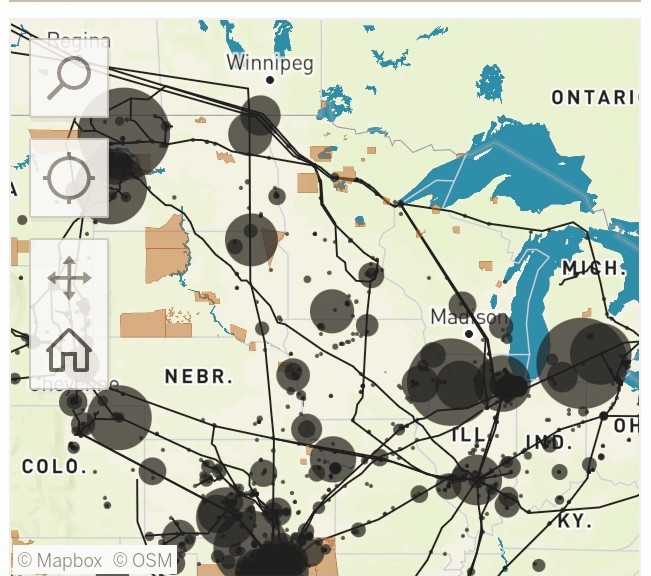Pipeline spills – Who pays the price?

Pipeline spills between 2010 and 2020 in the Upper Midwest and Northern Plains States. Black circles indicate size and location of involuntary oil, gas, and chemical discharges. Shaded patches indicate Tribal lands. Photo credit: Native Land Information System https:nativeland.info
Between 2010 and 2020 there were 3398 oil, gas, and hazardous material pipeline spills in the contiguous United States. That averages to about 29 unintentional releases per month. The cumulative cost of these spills was $2.64 billion. Many of these disasters were in close proximity to Native Lands.
On March 14, 2010 Magellan Pipeline Company LP, released 115 barrels of liquid petroleum on Leech Lake treaty land near Cass Lake costing emergency crews $340,000. The cost for environmental cleanup was $160,000. The amount paid by the operator was $2500.
On December 10, 2010, Enterprise Products Operating LLC Pipeline experienced a gas leak, during which 4,544 barrels of gas were discharged. The emergency cost was $45,000 with a cost of $0 attributed to environmental cleanup and, while property damages were at $76,940, the cost to Enterprise was a whopping $0. Enterprise, again on August 18, 2011, spilled 675 barrels of petroleum products on the Omaha nation, with an emergency cost of $135k, environmental cleanup at $85k and property damage at $7,368,470. Cost to Enterprise: $0 again. The cost is absorbed by government funds, solidifying the lack of accountability by pipeline operators.
West of Lake Traverse treaty lands, TransCanada Pipeline Operators, Inc. accidentally released 400 barrels of crude oil on May 7, 2011. Combined costs were $1, 025,000, while TC paid $1,000, less than 0.1% of the total cost. This encouraged a repeat performance. On November 16, 2017, 6592 barrels of crude oil poured out onto wetlands in the same vicinity as it did six and a half years before. This time the emergency cost was at $6 million and the cost of environmental remediation was $31.6 million, with property damage over $5.6 million. TC paid $823,400 or about 2% of the total expenses.
Usually when spills happen close to water or wetlands the National Oceanic and Atmospheric Administration (NOAA) handles the emergency response and environmental remediation. The National Response Center, Environmental Protection Agency, US Coast Guard, report any water born hazardous materials to NOAA’s Office of Response and Remediation (OR&R). All of these can be involved in the emergency response. The EPA, US Fish and Wildlife, State environmental quality departments and tribal representatives all can contribute to remediation efforts.
Fast forward to 2024. The NOAA-OR&R’s Emergency Response Division responded to 11 new oil spills in the month of January alone, resulting in water contamination in 6 states with steep remediation costs. In the same month, the Sac and Fox Nations were compensated for a 300,000 gal (7110 barrel) oil spill resulting from a pipeline rupture on June 8, 2022 into Skull Creek on allotment land in Oklahoma. The Sac and Fox received $7.4 million in civil penalties by implementation of The Clean Water Act in their settlement with Holly Energy Partners Operating LP and Osage Pipeline
Company LLC.
Later, on June 24, 2024, 2500 barrels of crude oil leaked from a Pipeline manifold at the Martin Operating Partners facility in Smackover Arkansas, eventually draining into Holmes Creek, Smackover Creek, and into the Ouachita River, according to the EPA.
In August, the Department of the Interior under Secretary Haaland and the Biden-Harris Administration allocated $12 million to four tribes for remediation costs associated with cleaning up leeching, runoff, and water overflow from abandoned oil and gas wells and covering open wells. The Caddo Nation in Oklahoma received $3.7 million, the Navajo Nation received $5 million, the Osage Nation collected $1 million, and the Seneca Nation of Indians was awarded $2.5 million for the Allegany Territory.
(Contact Aliyah Keuthan at kestreldancing@gmail.com)
The post Pipeline spills – Who pays the price? first appeared on Native Sun News Today.
Tags: More News
